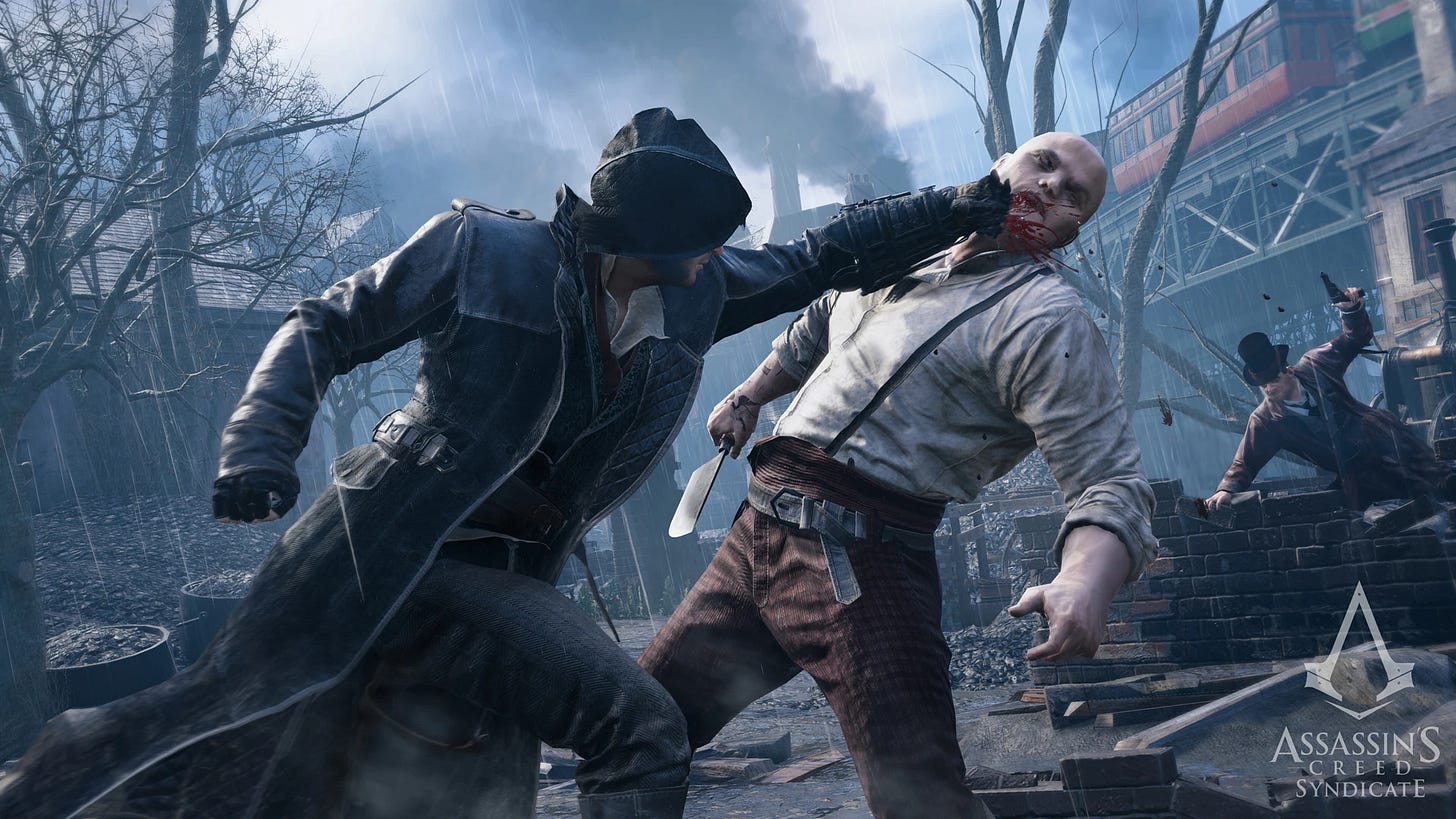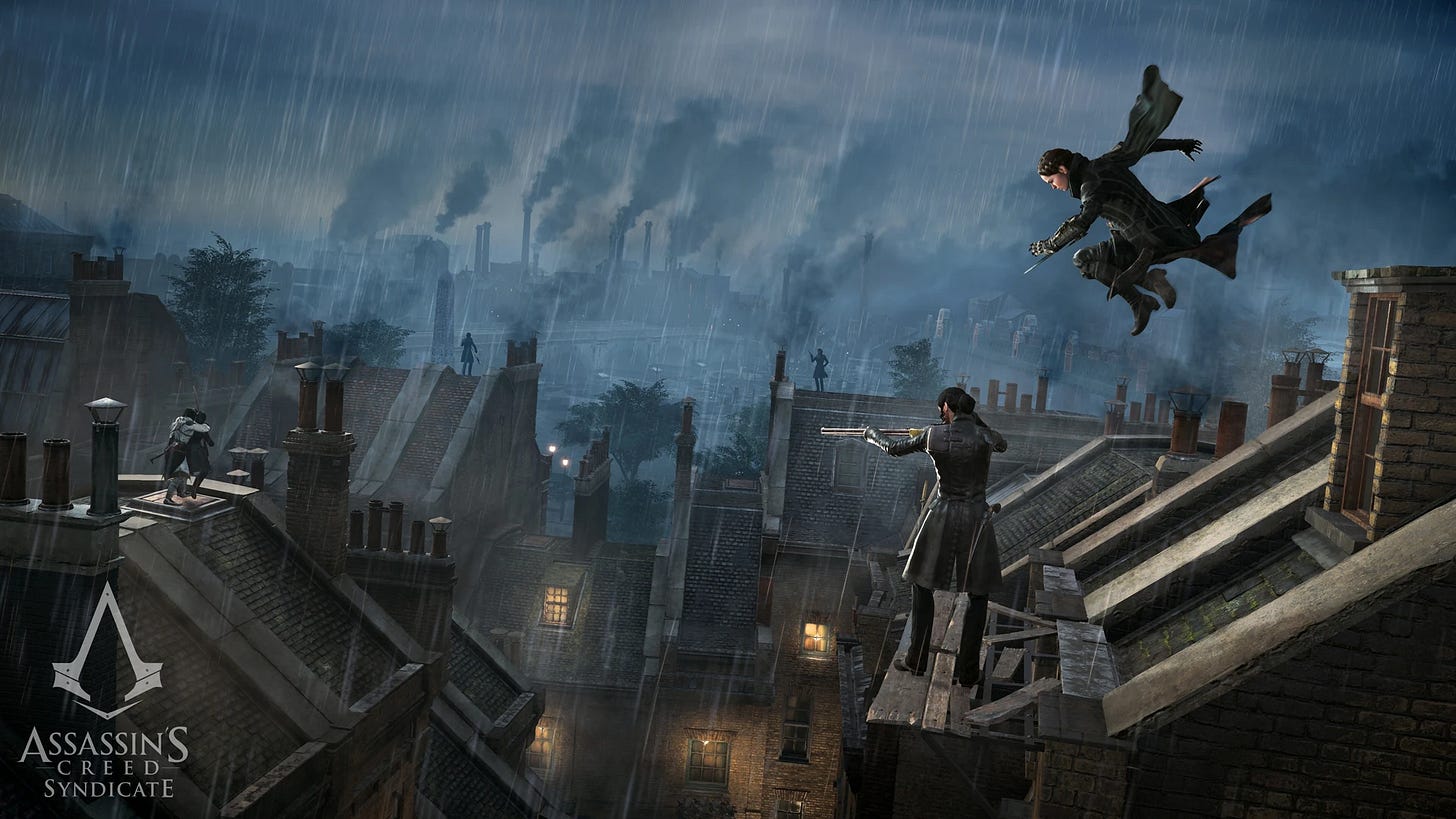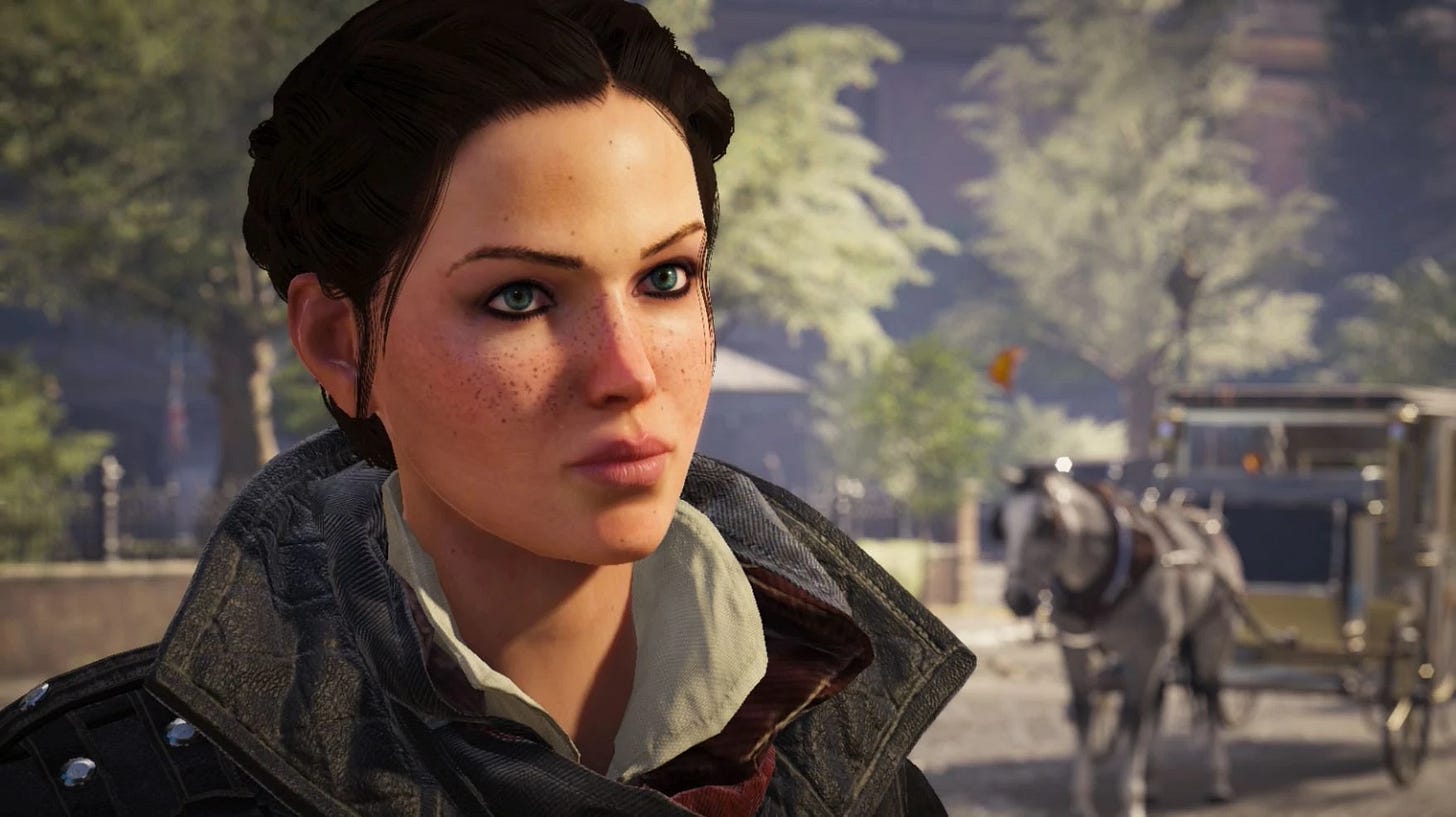Table of Contents
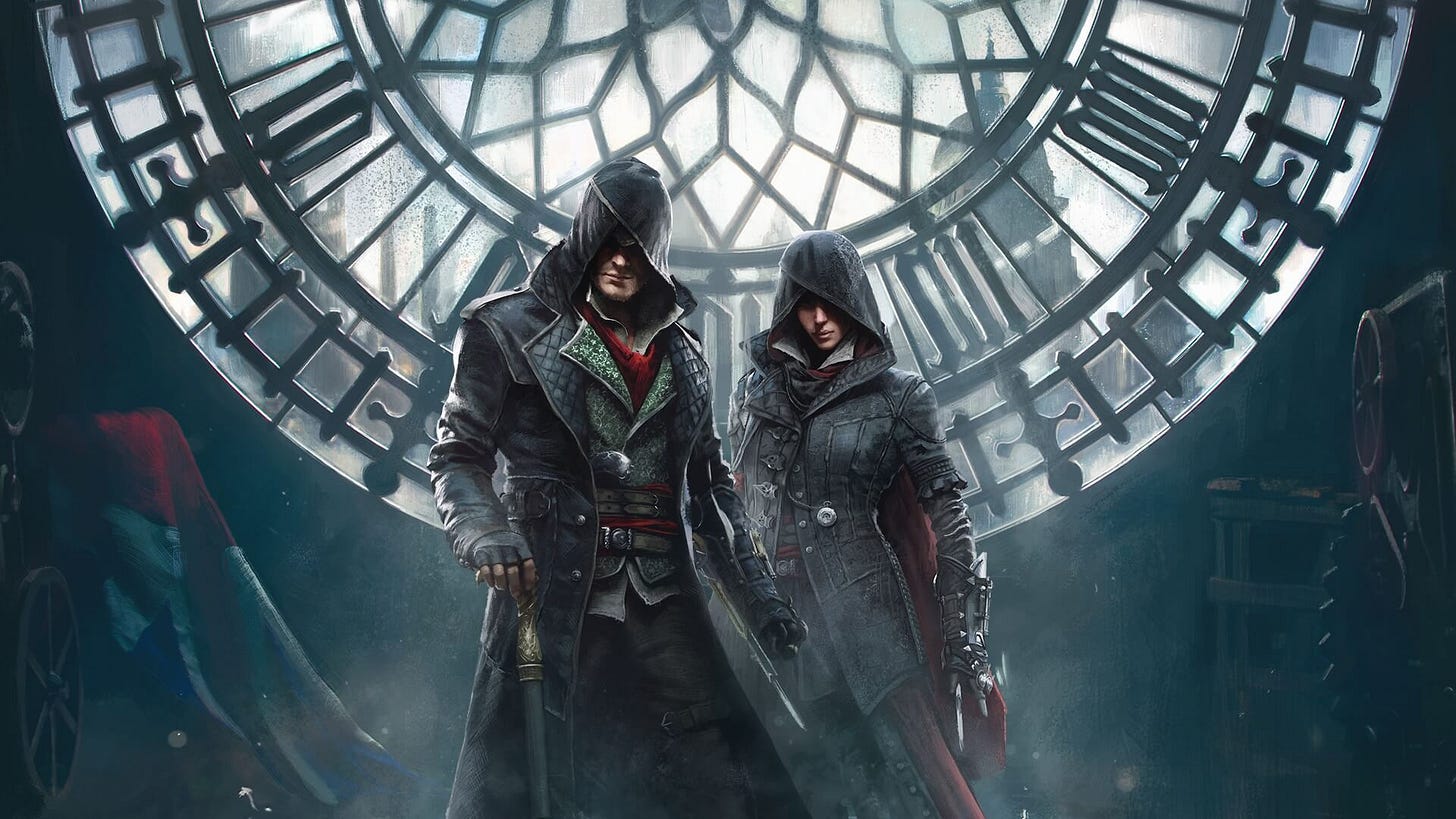
Even as the moment-to-moment experience was quickly refined, be it the world-building, the traversal or the overarching gameplay mechanics most prominently, the Assassin’s Creed franchise was never one to truly rest on its laurels.
Developer Ubisoft and their various individual studios, with each entry, working to bring something new to the table, be it within those tentpole elements or smaller, still impactful tweaks around the edges.
A sense of familiar if consistent growth that informed every mainline title over AC’s first eight years, though with Assassin’s Creed Syndicate, which released ten years ago this month, in October of 2015, lead developer Ubisoft Quebec saw that creative evolution be crystallized.
The action-stealth template, the open-world, the iconography.
Syndicate, standing on its own but as well, in hindsight, acting as something of a closing chapter for what became the first era for the long-running series.
And so, here it is, a decade later.
Intro (Syndicate)
Come 1868, London is seemingly awash in progress, benefiting its cultural status as the epicentre of the Industrial Revolution.
Though behind the curtain, things are far more sinister.
Having consolidated his influence over nearly every facet of society - healthcare, transport, politics and the criminal underworld - Templar Grand Master Crawford Starrick (Kris Holden-Ried) has designs on subjecting not just London but all of England, the world, to his whims.
And as his subordinates, led by Lucy Throne (Emerald O'Hanrahan) incircle the city, they will stop at nothing to find a powerful Piece of Eden, a Shroud, rumoured to be hidden somewhere in the capital.
Yet rising to oppose them are the twin Assassins Jacob (Paul Amos) and Evie Frye (Victoria Atkin) who, with the help of their various allies, including fellow Assassin Henry Green (Jaz Deol), look to dismantle the Templars, liberate the boroughs and return London to the people.
So after the franchise’s four previous instalments all dug into the Assassin-Templar conflict, to varying degrees, with a more grey area approach, Syndicate’s angle, in contrast, is more front-facing: lively and hard-hitting, it starts with two of the game’s biggest pillars, combat-and-stealth.
Combat + Stealth
While Unity reoriented AC’s combat around a heavier, more grounded system, Syndicate, though it builds somewhat off that blueprint mainly recalls the counter-kill style the series is best known for, if within the context of its chosen period.
As discussed in the game’s promotional material, historically, carrying open weaponry wouldn’t have been feasible, in late 19th-century England. So rather than giving the player a host of weapons to choose from, Syndicate’s melee options are more streamlined, with just three classes: brass knuckles, kukris and cane swords, though with only one able to be equipped at a time and with each very lightly filling a specific niche (close range, mid-range and distance). In support, while firearms are built into combat well, via finishing moves and executions, this is less so for smoke and voltaic bombs, which don’t have much weight in comparison.
Instead, there is an inherent workman-esque thinking, with combat not being an expanded, drawn-out affair, at least when evenly-levelled. One is encouraged to end engagements with purpose but also, as quickly as possible, as was done in the days of old, by prioritizing bigger threats and building up a combo count.
Each weapon class has different levels of attack, stun and lethality, with a small amount of choice feeding into that decision from a gameplay perspective. All counterbalanced, in the early-going especially, with Syndicate’s light, RPG level scaling.
Mistime a counter for example, more so when up against a large group of higher-levelled enemies, the player can (and will) quickly find themselves overwhelmed. The timing windows, while they may be pretty forgiving aren’t totally open either, the beams of a back-and-forth flow focusing on snappy guard-breaks, stuns and multi-kills. Standard enemies can be taken down in just a few hits but gunmen and brutes require specific combos and if surrounded, it does take a measure of skill, on the player’s account, to emerge victorious.
And sure, practically speaking, while Jacob and Evie play functionally the same, there are a few notes of distinction to be found, with what is for Syndicate, a first for the series, two playable protagonists at the same time as it relates to the game’s combat and stealth.
Jacob is the more combat-focused character, able to take greater damage, pull off automatic headshots and defeat enemies in rapid succession, adding a couple of base if not radically diverse wrinkles to each of his encounters (though Evie, if the situation calls for it, is more than capable of taking on a battalion of goons).
Both Assassins, while they do share quite a few, have their own unique set of animations/mo-cap stunt work for single and group finishers as well, depending on the weapon used or immediate situation.
From light environmental takedowns, to wall-based finishing moves or using momentum to their advantage, in say, kicking an opponent clean off a moving train. They’re all particularly brutal but flashy too, in a character-appropriate way. The twins are on a mission and nobody, particularly the Templar rank-and-file, will slow them down.
The game’s main DLC, Jack the Ripper, does build out the combat more through its QTE-based fear system and contrasting playstyles (that being, a more seasoned Evie’s non-lethality and the titular serial killer’s excessive violence). For the most part however, outside of being deliberately under-levelled in the later boroughs of the base game, whilst Syndicate is never particularly challenging in this arena, it does pair nicely with what it is working in tandem with: the stealth mechanics.
Retaining the OG era AC stealth experience of being fun if functional, Syndicate does expand on the classic low/high profile system to a certain extent, with a few inclusions.
By default, Jacob and Evie truly do hide in plain sight. Only with a button press, will they move into “sneak mode”, crouch down and pull up in their hoods.
The player, naturally, is pushed to take to the rooftops here, a bird’s eye view, forever to be the best defence.
Fittingly, the traditional version of the series’ sixth-sense, Eagle Vision, which both twins have access too, can be further upgraded to increase its effectiveness, tagging capability and range, as to give the player a leg-up prior to advancing through any hostile compound. Berserk darts can see their effects spread to multiple enemies via fire pits while throwing knives, the primary ranged tool for stealth, can dispatch same and lower-levelled foes in single hits.
The kidnapping mechanic, in a similar vain, does switch things up a little bit, through mission sub-objectives that require the player to go unseen or to hone in on a specific enemy while slipping away silently, which melds well with the freestanding social stealth.
Armed to the teeth though they may be, the twins are adapt at moving amongst the people, allowing players to create opportunities to reach their targets from almost any angle: even if, by default, certain enemies will spot them in crowds almost immediately, forcing something of a risk-reward approach until specific skills are unlocked.
Though while Jacob is a viable enough stealth option, in contrast to her brother, the play-style is Evie’s speciality, in a way, exemplifying the franchise’s “Assassin” fantasy to a tee. She can carry twice as many throwing knives, with a higher damage count, has a lesser chance of being detected outright and with the proper skill point investment, eventually, she can blend into her surroundings when stationary, rendering her all but invisible.
Alongside this, the much-loved “Black Box” missions return but when lined up against their debut in Unity, they are far more fleshed-out, responsive and worth pursuing in the interest of the most cinematic kill.
All of these elements, they add a slight but noticeably different dynamic to every infiltration. The pure gameplay versatility between the two protagonists may not amount to massive changes in approach (as one can see in Quebec’s dual-protagonist follow-up, Assassin’s Creed Shadows, for example) but it does help to keep Syndicate fresh, as one steps into its version of Victorian London.
Open World + Exploration
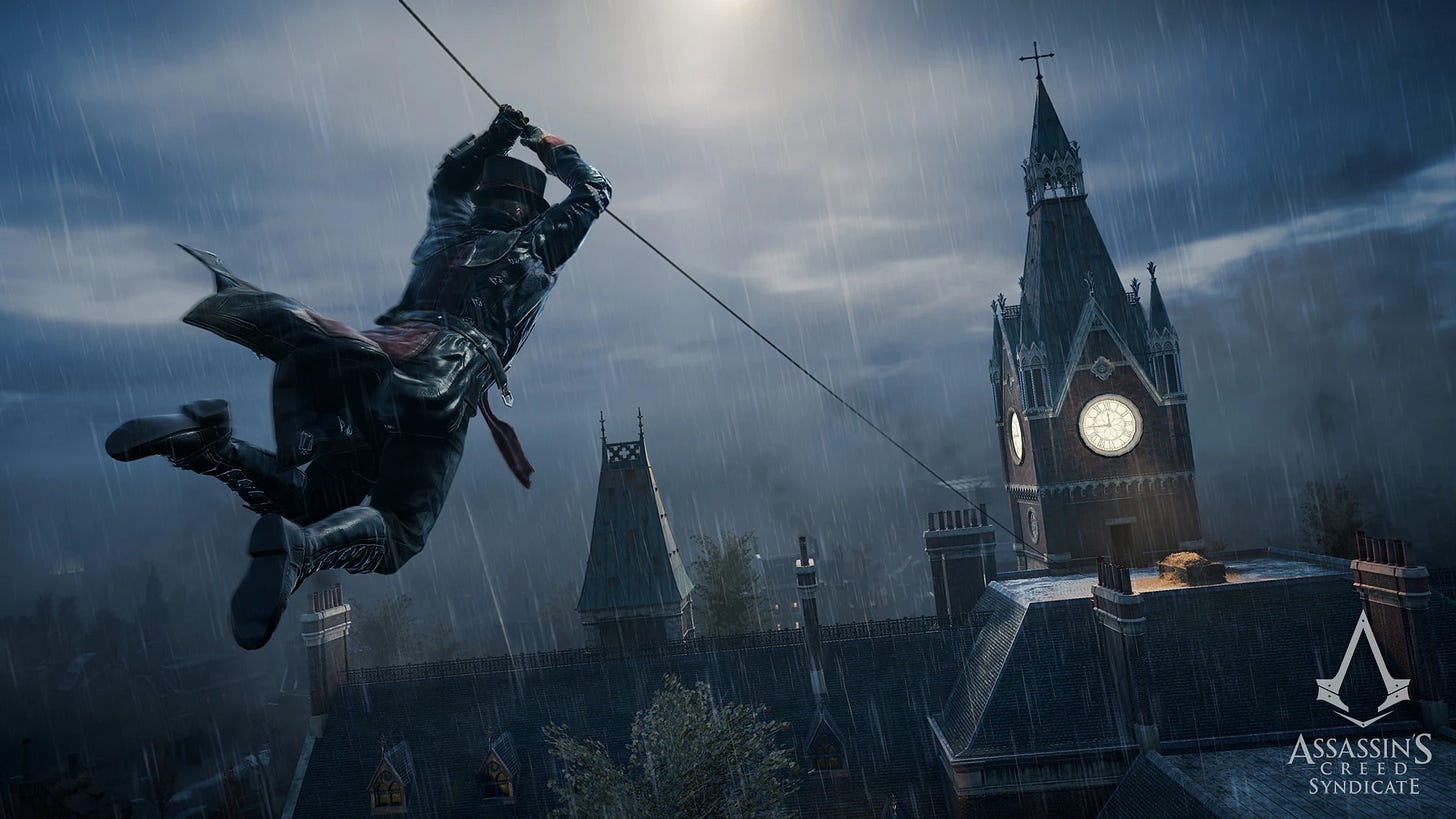
Upon setting out on their crusade, the Fryes learn dislodging their rivals from power will be no small feat.
Next to their bigger targets are the Blighters, a vicious street gang under Templar command who dominate the city’s underground. So in response, they form their own gang, The Rooks. In essence, to fight fire with fire and in tying some measure of the overarching story into the open-world experience, Syndicate then, presenting a sense of progression that feels meaningful in a player-first way.
For it is under this context where the majority of the game’s open world activities take place, moving through the city and undermining the Blighters at every turn.
It could be shutting down factories run by child labour or delivering bounties to the Met. Assassinating high-value Templars and disrupting supply lines, all building towards a gang war for control of one of London’s (as depicted) seven boroughs. Although it doesn’t quite line up in the same way, the gang mechanic is clearly meant to be a spiritual successor of sorts to the recruit system first introduced in Brotherhood and furthering this, The Rooks have a separate skill tree: meaning that as the player slowly builds out their network, the gang’s ability increases too.
From their raw strength to passive boosts that generate income or more physical rewards, which, increasing the twin’s loyalty with a select few of their associates, will unlock the necessary materials to craft Syndicate’s best gear and weaponry. In pursuit of those level-ups, one can switch between the twins anytime when off-mission in the open world through a button press in the pause menu (utilitarian sure, especially when compared to other games with similar mechanics but also allowing the player to jump back into the action almost immediately).
There are a few progression-based, side-mission chains as well, all of which focus on one of the game’s many historical figures.
Keeping them mostly siloed, instead of trying to work them into the main narrative, as other games in the series have is a decision that works, even if their narrative punch, overall, isn’t too much. While on the periphery, there are the return of crowd-based events and the game’s few collectibles.
One, flower collecting has noted bearing on Evie’s story while finding all the music boxes will unlock, for Evie, the game’s obligatory First Civilization/Isu armour, alongside a powerful combat buff. Elsewhere, the extraneous open-world content, difficulty-scaled fight clubs and horse races, are enjoyable enough but mostly superfluous and will get repetitive if tackled in succession.
Though Syndicate’s London, regardless, is great to just take in, as is the standard for the series.
It lacks the sheer scope and NPC destiny of Unity’s Revolutionary Paris yes but it has a charm that is impressive all the same. Chronologically, the game remains the closest a main AC has ever gotten to the series’ modern day setting and the exploratory aspect this provides is intriguing all its own.
From the lighting, art design and soundtrack, with Austin Wintory (alongside the musical group Tripod) bringing a period-appropriate sound, incorporating both Victorian-era spins on established motifs, next to humorous murder ballads.
The sky, masked with thick smog as rain pours, train stations, bustling with crowds of eager commuters. There is a noticeable variety in the boroughs, too. Whitechapel’s overcrowded, poverty stricken streets, the sweeping vistas provided in the City of London or the distinct feel of Westminster. The view from the very top of Big Ben, masquerading one’s way through Parliament or the opulence of Buckingham Palace. And in the brief story section taking place in 1916, London, under siege by German agents, is given another facelift through the scale of Tower Bridge and the enemy zeppelins above it.
Meanwhile, traversing the city, whatever the time period, sees the game embrace supports beyond familiar series markers, to inconsistent success.
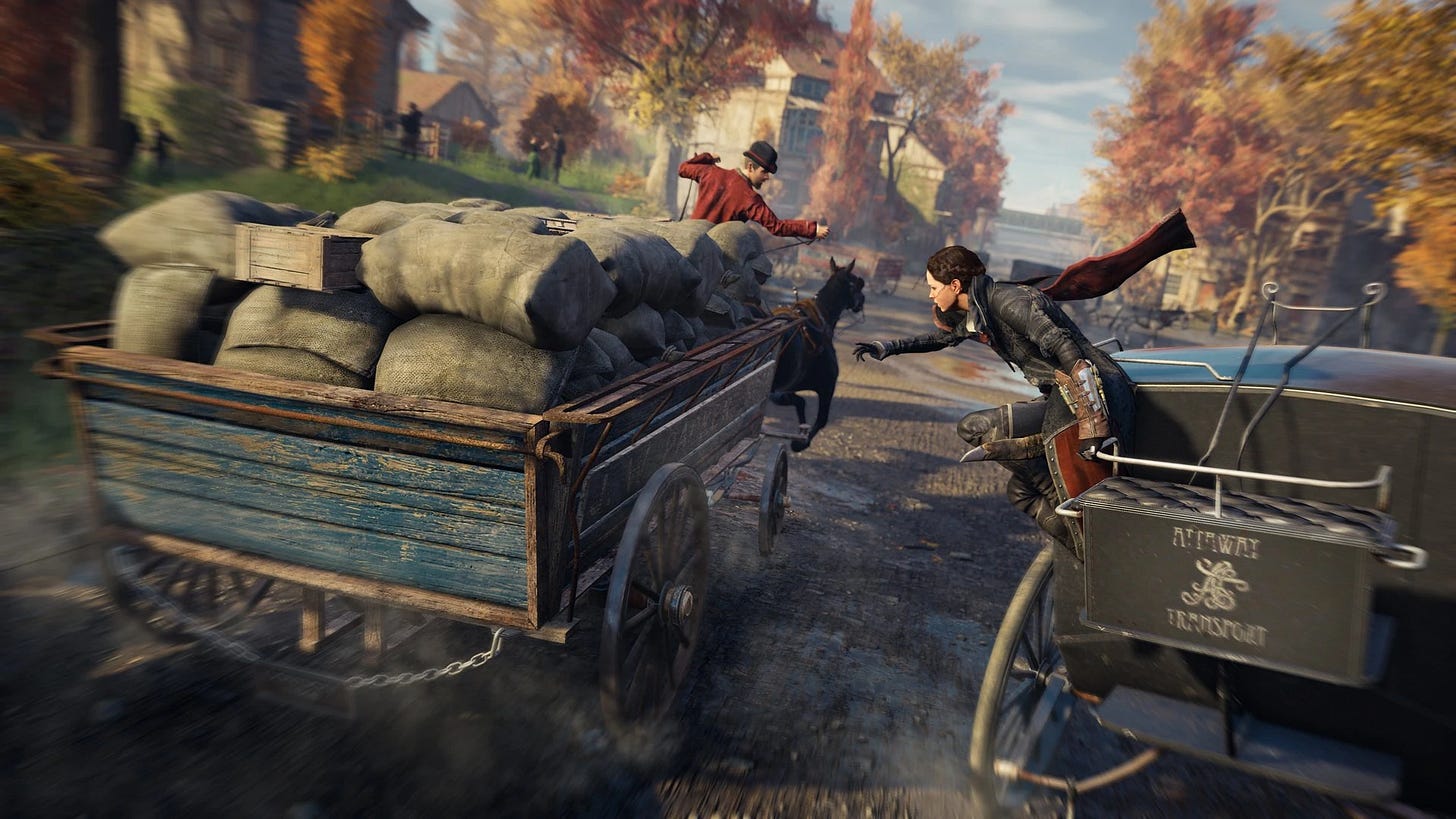
Ostensibly retaining Unity’s parkour, Syndicate simplifies the system, to undeniable disappointment.
The twins still move with power, speed and flair via the returning free-run up/down mechanics but the pure expressiveness benefiting precise player input and experimentation is no longer there, at least, not at the same level, with the animation packages and physics having been greatly scaled back.
The bones may be present but Unity’s more complex movement depth, even the idle potential for it, isn’t anywhere to be found.
London just isn’t built around rooftop-only navigation in the same way.
Instead, with the game’s two new traversal additions, one must find a mix between the high ground, operating on street level and Frogger-jumping their way across the Thames.
Taking to horseback, even just to go from one destination to the next, has been present in some way since the very first title in the series but with the implementation of horse-drawn carriages, Syndicate makes this element far more present.
Not grounded by any sense of faux-practical realism, the game’s carriages are super arcade-y in presentation, rapidly gaining speed and able to slalom through even the most cramped of London’s streets. One can hijack them and their cargo or be overtaken themselves, this, oftentimes concluding with a fight to the death between Blighter and Assassin as one screams over Lambeth Bridge. Very hide-in-plain-sight-esque? Not whatsoever and it can feel noticeably unpolished at times too, during races especially, limited by visible rubber-banding.
An idea that does well in smaller doses, though it buckles under too much scrutiny.
Yet, despite those caveats, it is great fun, in a monotony-breaking way as is the game’s other distinctive tool, the rope-launcher.
Recruiting Alexander Graham Bell (Mark Rowley) as the historical-inventor-in-residence, as is early series standard, Bell refines the device, originally stolen off a Templar target, for both twins. Operating as a miniaturized grappling hook of sorts, it cuts out the middle-man so to speak, allowing them to reach the top of any building or move across a large gap, within range, without interference.
It is an oft-criticized inclusion from some segments of the fanbase, locked-in, boxed animations, with no player contribution. And used in this way, as a be-all-end-all, it can definitely make traversal feel stagnant. But utilized as a companion to parkour, an occasional accelerant, it brings an interesting sense of forward momentum, through escape, trailing a target or just keeping the player in motion.
And fittingly too, as Syndicate’s story has momentum in no short supply.
Story (Base Game + DLC)
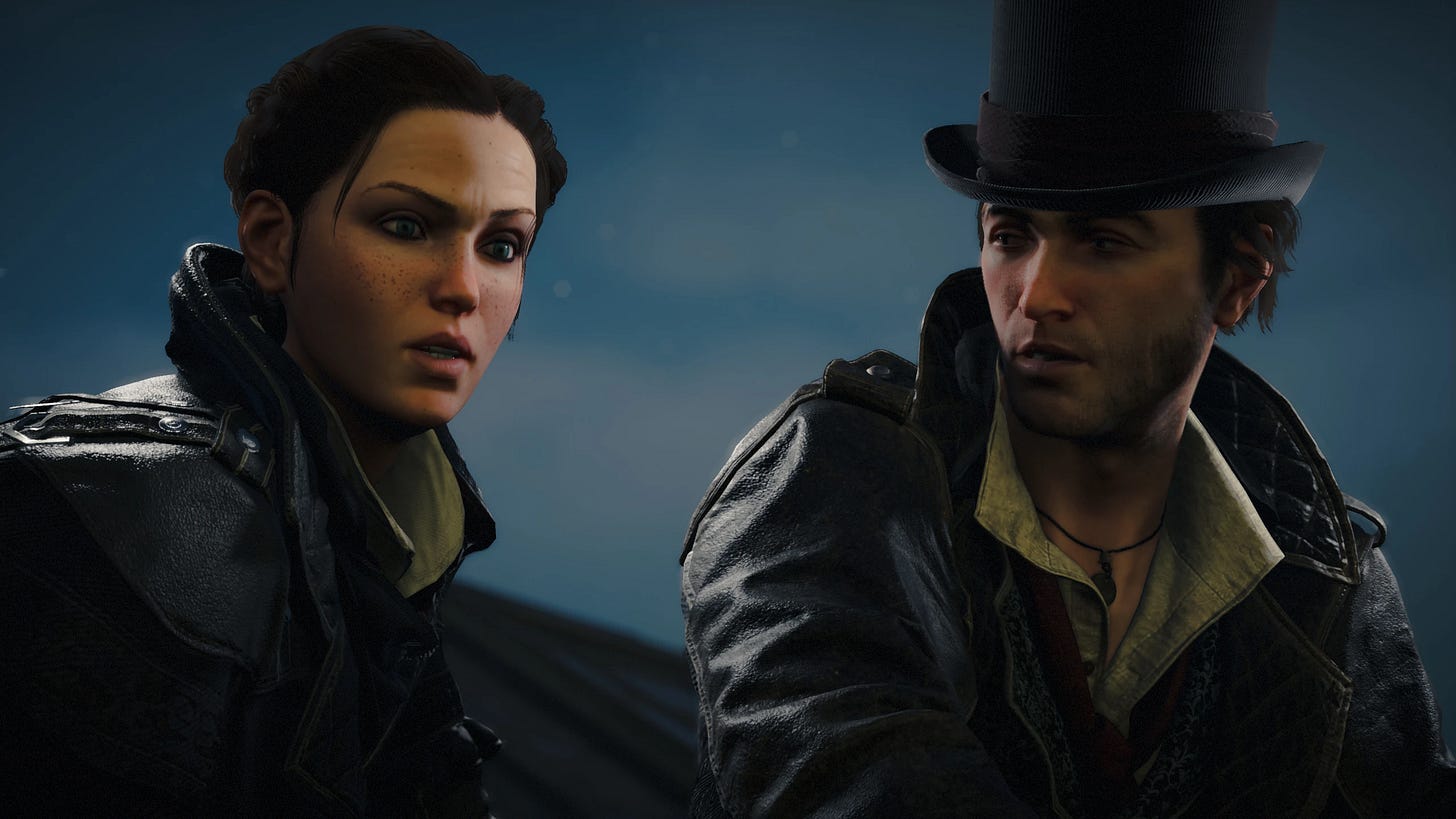
Having been raised as Assassins since childhood, the twins aren’t conflicted on the morality of their mission or approaching The Creed with a healthy dose of skepticism, as most of their immediate predecessors were.
Though without this framework, the right-and-wrong pull that defined those titles (III and Black Flag, most notably), it inherently lends Syndicate’s main narrative a lighter, more black-and-white feel. Near a hit-list, though without Rogue or Unity’s overt seriousness.
Not without some semblance of weight of course but it simply means that previous energy must be redirected elsewhere.
So even though its two protagonists are very much working towards the same, bigger-picture end, before they’ve even established themselves in London, the twins begin to diverge on their methods of choice.
Henry, who has been working as the sole operative in the city, argues for a unifying strategy but Jacob believes only going after Starrick’s lieutenants directly and then, the man himself, will weaken the Templar cause. Evie feels locating the Piece of Eden should be their priority, given the ramifications of its power being misused should their enemies find it first.
They disagree (as siblings do) and while they aren’t opposed to assisting the other should they need it, their individual stories, right from the beginning, are separated on this dividing line.
And this, overall, is Syndicate, sequence-by-sequence. Jacob investigates one of the Templar’s take-over-London-schemes, be it their corruption of medicine, finance or politics and sets about to take it down, more often than not, by going straight for the head.
Evie meanwhile, occasionally teaming up with Henry, works to unravel centuries worth of mystery surrounding the Shroud before the Templars do, while also stepping in to stabilize any one borough, in the aftermath of her brother’s assassinations.
This structure quickly feels familiar, although not necessarily in a way where it becomes tedious.

Syndicate moves briskly, never lingering, never feeling too bloated or uneven in its pacing, relatively speaking.
Tinged with predictably all the same, there may not be too many surprise notes in the beats it does hit but with its character work and narrative progression considered, it builds to an effective climax.
Starrick, all his allies slain, makes his final stand at Buckingham Palace, where he has located the Shroud. Ready to go their separate ways, the twins compromise on one final mission, where, with Henry’s help, they bring the Templar down, make amends and set out to protect the city together, having learned a thing or two about themselves along the way.
Throw in a couple of series deep cuts (like Evie uncovering the secrets Edward Kenway left behind for his fellow Assassins), it all lands well yes but it isn’t without criticism.
For one, it is clear that the game’s creative team couldn’t find (or chose not to find) a proper balance when it came to spotlighting both their protagonists.
Evie’s immediate story, defeating Lucy Throne, wraps up around the mid-point, leaving her in something of a holding pattern until the very end, while Jacob takes the lead in virtually all of the game’s assassinations. Through this, Evie’s presence is continually diminished as the campaign goes on, to the point that the eighth sequence, the second-to-last, is Jacob’s in totality without even an appearance from Evie, save for the block’s introductory lead-in.
It is a missed opportunity, not only for the dynamic they present but for possible storytelling avenues, as well. Both are strong characters, though Syndicate’s inability to speak to this fairly, in prioritizing one over the other, is apparent and to its repeated deterrent.
As the first woman lead in a main series title, Evie deserved better here.
The game’s thematic voice is another point of contention for some, often going lighter, treating its historical period and broader narrative with an air of flippancy, rather than the comparatively serious touch AC was (and is) known for.
This is true to an extent (and is most noticeable in the dialogue, which, to be fair, doesn’t hide from its occasional campiness) but it is a critique not fully-weighted all the way through.
When it needs too, the story is more than willing to pull up at those stops as it does most visibly during the base game’s most interesting detour, The Darkest Hour.

Not quite a proper DLC and yet, not an off-handed string of side-quests either, The Darkest Hour, which is built right into the base game, is a natural, expanded follow-up to Unity’s Helix Rifts.
In 1916, as The Great War rages across Europe, an invasion of London by German agents sees the city under siege.
Needing to stop them before they dig their claws in further, Winston Churchill (Rick Miller) recruits Jacob’s granddaughter, Assassin Lydia Frye (Lisa Norton), to do what she does best: find their mysterious ringleader, silence them and maintain whatever semblance of peace she can.1
Mechanically, Lydia plays identically to Jacob and Evie, with only the inclusion of switching electrical generators on/off, in order to confuse enemies, adding any sort of differing gameplay. The player is still using the rope-launcher, smoke bombs and whistling from corners, etc. But these missions do get quite a bit of milage out of simply allowing the player to exist in a similar but refreshed space for a couple hours of play-time.
Soldiers patrol the streets and with the inclusion of Tower Bridge, a new parkour challenge is available. A unique open world activity, gunning down waves of German fighters and collectibles are there, should the player wish to pursue them, while the bantering back-and-forth between Churchill and Lydia is sharp.
There isn’t too much for the story to hang its hat on per se - Lydia easily roots out the agents causing discord - but the hook is just who their leader is: a Sage, like François-Thomas Germain, Bartholomew Roberts and John Standish before them, the Isu Aita, reborn once more.
Juno (Nadia Verrucci), who at this point in time was the series’ over-arching, First Civilization antagonist, appears often here, informing the player that, though they may resist, her and Aita’s day of reckoning has nearly arrived.
Good timing, too.
As in the modern day, Shaun (Danny Wallace), Rebecca (Eliza Schneider) and Galina (Patricia Summersett) are hunting down the Shroud via the twin’s memories, in a race against established Templar villains Otso Berg (Andreas Apergis) and Violet da Costa (Lucinda Davis).
Regulated to a series of found-footage cutscenes, these segments conclude the modern-day arc put forth in Unity (and more broadly, Black Flag onwards) but ultimately, they amount to very little. While it is cool to see Shaun and Rebecca in the field, Juno’s story and everything connected to it (Juno, using the Shroud to detach herself from “The Grey”, the Instruments of the First Will, etc, etc) was all dropped once the RPG-era began and was instead, to virtually no fanfare, concluded in the franchise’s auxiliary material.
Not a waste altogether but in hindsight, ineffectual all the same.
Syndicate’s supplementary DLC episodes feel this way too, with The Last Maharaja and The Dreadful Crimes both, clearly, little more than content cut from the base game repurposed at a higher price point, which is never a ringing endorsement.
The game’s major expansion, Jack the Ripper however, in essence a semi-sequel, is a different case.
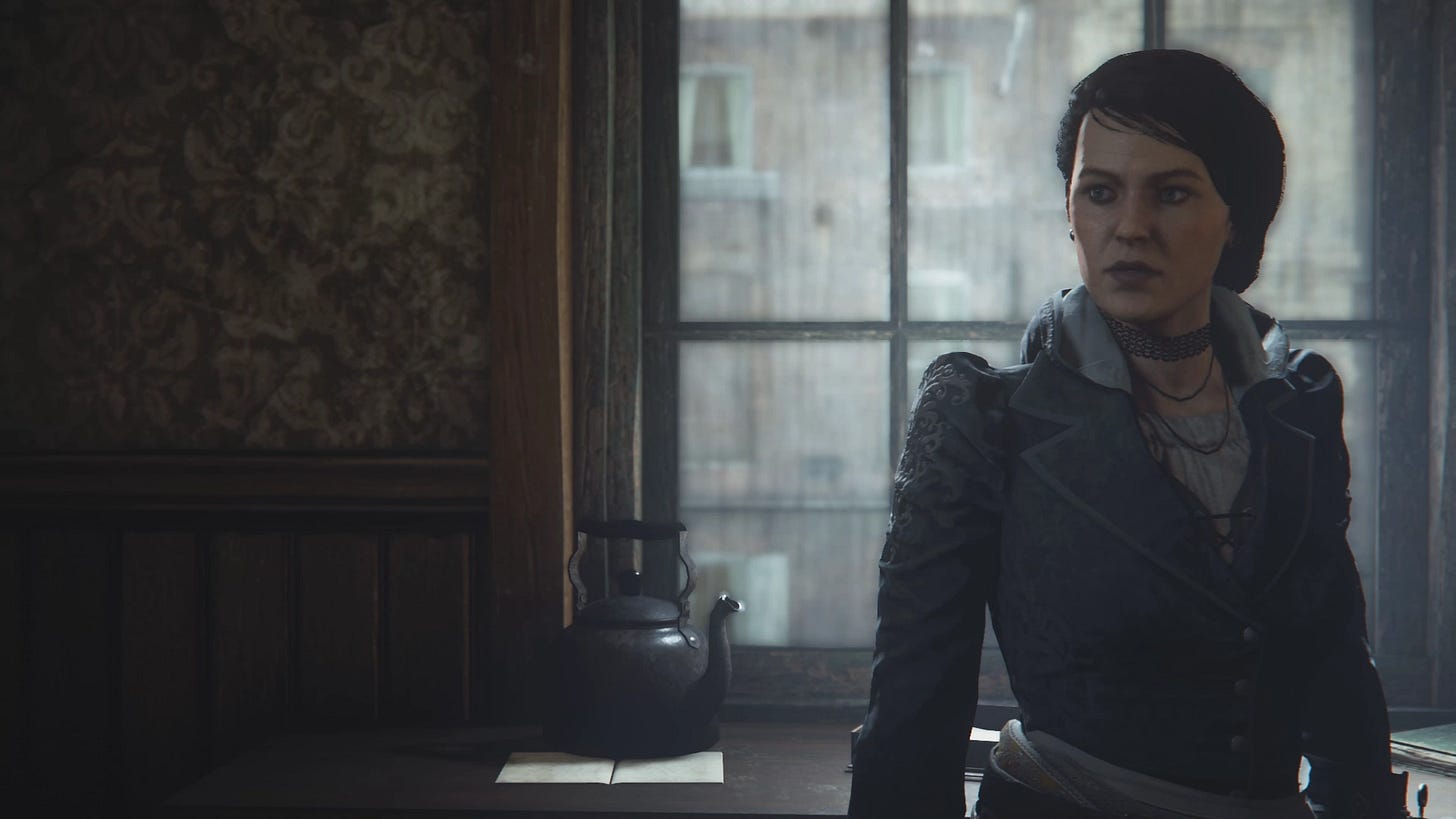
Following the eradication of the Templars from London, Jacob begins leading the Assassins, while Evie eventually relocates to India with Henry, learning the “fear tactics” of the Brotherhood there, lessons then imparted to her brother and his students.
But twenty years later, in 1888, the city is thrown into chaos once more.
One of Jacob’s pupils, Jack (Alec Newman), having developed a twisted version of The Creed, usurps and kidnaps his mentor, kills any sent to stop him and vows to reshape the Assassins in his dark image, plunging the boroughs, notably Whitechapel, into the Autumn of Terror.
And so Evie, returning to London, must work against the clock.
To find her brother, protect a citizenry teetering on the brink of anarchy and stop the newly-dubbed “Jack the Ripper” before it is too late.
The player can feel the change in atmosphere and presentation as soon as the title card drops, dark, heavy, unnerving, a noted departure from the base game’s generally more easy-going tone.
And from a storytelling point-of-view alone, it is a wildly bold swing. Here is one of history’s most notorious serial killers, reimagined within series’ lore as a rogue Assassin.
Smartly, although it prods at some semblance of fictionalized backstory, the game is careful to avoid cultivating any sort of sympathy for Jack, given the brutal nature and the larger context that continues to surround those real-world crimes (and to this point, the character’s true identity remains anonymous).
Though even with that considered, it is clear the team worked with interest to provide something engaging when it came to Ripper’s gameplay, if not a total shift.
Some previous open world activities are repurposed with an appropriate sheen and the fear system forces the player to learn a new, if not complex combat approach, after comfortably settling into Syndicate’s primary loop.
Evie now prefers to go non-lethal whenever possible but finds this more-and-more difficult as the Ripper’s grasp on the city grows tighter, her only ally in Frederick Abberline (Sam Crane) can no longer protect her and the very nature of the Brotherhood’s clandestine status threatens to be undone.
In contrast, in the few brief sections where the Ripper himself is playable are over-the-top violent in a way that is out-of-form for the series, if nothing else, speaking to the character’s pronounced instability, a feeling that only grows as Evie closes in.
After taking down his various lieutenants and working to restore some semblance of order, Evie tracks The Ripper to Lambeth Asylum, where, raging, Jack claims the Assassins have been lost for too long, believing themselves and their ideals, impenetrable, above criticism. This, which does not extend to his morality. Killing him and ending his reign, Evie finds Jacob, alive, and swears Abberline to secrecy, knowing the continued existence of the Brotherhood depends on it.
Though as well that the damage Jack caused, it will not be easily undone.
So unlike the base game, which, again, often brushes up against a feeling of predictability, one can’t be sure, to unease, where Ripper will go next. It plays to a conviction that is present throughout much of Syndicate, starting with its performances.
Performances (Supporting)
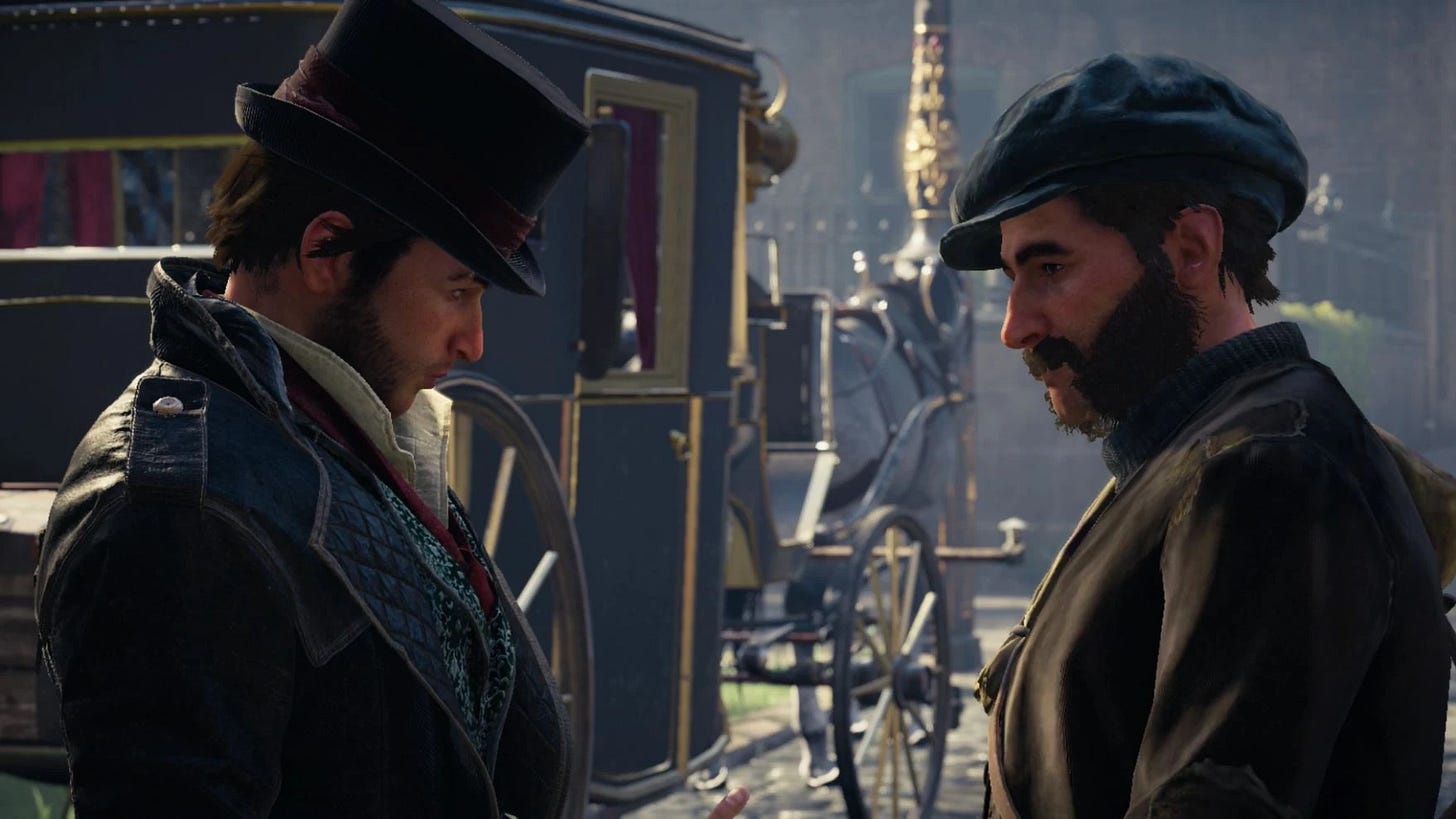
While most Assassin’s Creed rosters are usually stock-full of historical characters, the Syndicate team keeps most of theirs on the edges, apart of their own side-mission chains, with a few exceptions: Alexander Graham Bell (Mark Rowley), Charles Darwin (Julian Richings), Queen Victoria (Ellen David) and Duleep Singh (Avin Shah) to the most prominence, all play various roles in the game’s story, without too much interference.
With the Fryes steadily establishing themselves in London, moving upwards in a growing social circle, these friendships feel mostly earned, if checklist-ed at times (and in the case of Queen Victoria, philosophically opposed, which is acknowledged), even if all the actors bring something to each, considering the real-world confines they’re working with.
But as Frederick Abberline, Sam Crane is given the most screen time, comparatively, to which he puts to noticeable use.
As he first meets the twins, Abberline is still looking to prove himself in London’s police force and is often enlisted by Jacob, who, humorously, has no qualms about appealing to Abberline’s professional ambition when looking for assistance in taking down targets.
He’s played to comedic effect in the main campaign, a self-made “master of disguise” often bewildered at the situations the siblings put him in, though it is within Jack the Ripper where Crane truly makes his mark.
It tracks.
Historically, Abberline was closely associated with the case and Crane presents a man who is beyond his wit’s end. He wants to help and respects Evie but as the Ripper sews chaos, he is besieged on all sides and leaves nothing to the imagination: to quell the panic engulfing the city, if he must, not only will he arrest her, he’ll expose the Assassins themselves.
Crane brings a really strong amount of solemnity in these moments, considering the contrasting nature of the base game.
As Henry, Jaz Deol doesn’t have the same amount of material to work with but he makes it worthwhile all the same.
With London all but abandoned by the Assassins prior to the twins’ arrival, he is the lone member of the Brotherhood operating in the city, eager to support their efforts to topple the Templars however he can, through recon or planning. Not a mentor in the strictest sense but their closet ally all the same, the only one who can truly understand the ups-and-downs of their crusade.
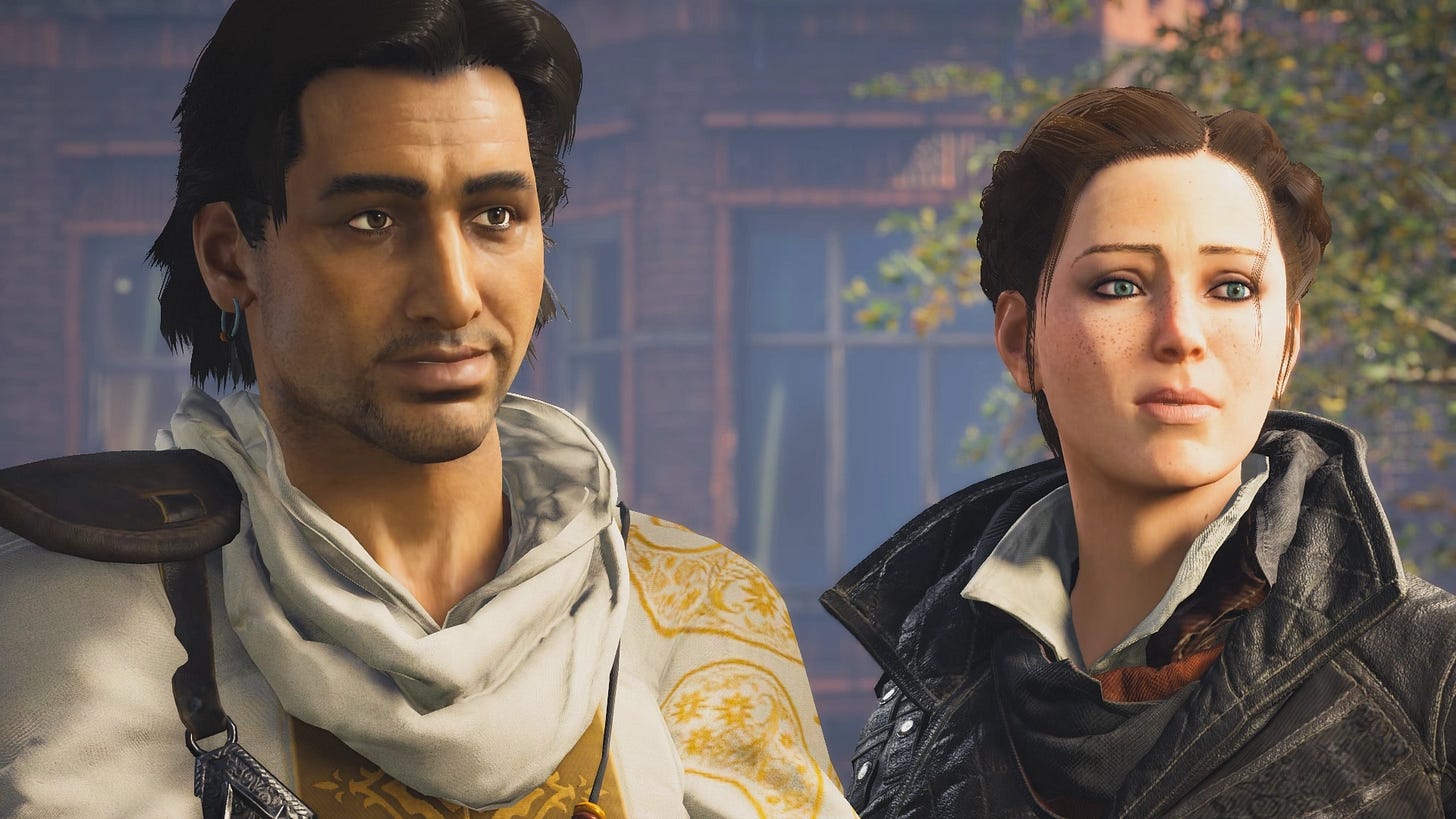
The catch though is that Henry doesn’t fit the Brotherhood’s traditional archetype, someone who, while he is committed to The Creed, lacks the “killer instinct” to be a truly effective field agent.
It is an angle, characterization-wise, the series rarely presents, so its inclusion here is neat, even if, ultimately, it doesn’t amount to too much. Henry’s backstory was further expanded on in Syndicate’s companion novel Underworld but it sees minimal light in-game (not even his birth name, Jayadeep Mir, is verbally revealed).
Instead, the primary focus of his arc is through his relationship with Evie as they hunt for the Shroud across the city. Evolving from friendly bantering to awkward flirtation before realizing that, yes, they’re falling in love.
It works well enough sure but can seem grafted on at times, with little interiority (especially following Unity, which made its love story central to the narrative). Fortunately, Deol brings a good amount of lightheartedness to his portrayal that makes Henry seem honest, genuine, an Assassin outside of the usual mold.
When it comes to the game’s antagonists, they fill exactly the roles they need to, no more, no less.
As Crawford Starrick, Kris Holden-Ried is, quite literally, a moustache-twirling villain, though Emerald O'Hanrahan gets a little more, her Lucy Throne, locked into a duel of wills with Evie for the game’s first half. Nathalie Toriel’s Pearl Attaway and John Hopkins as Maxwell Roth are both initially presented as uneasy allies to Jacob before their true colours are revealed and while Alec Newman’s Jack the Ripper is the very definition of unease (and Newman delivers), by design, the character is little else.
For Syndicate is bound most tightly, right from the start, by the engaging, spirited performances of its leads.
Performances (Leads)
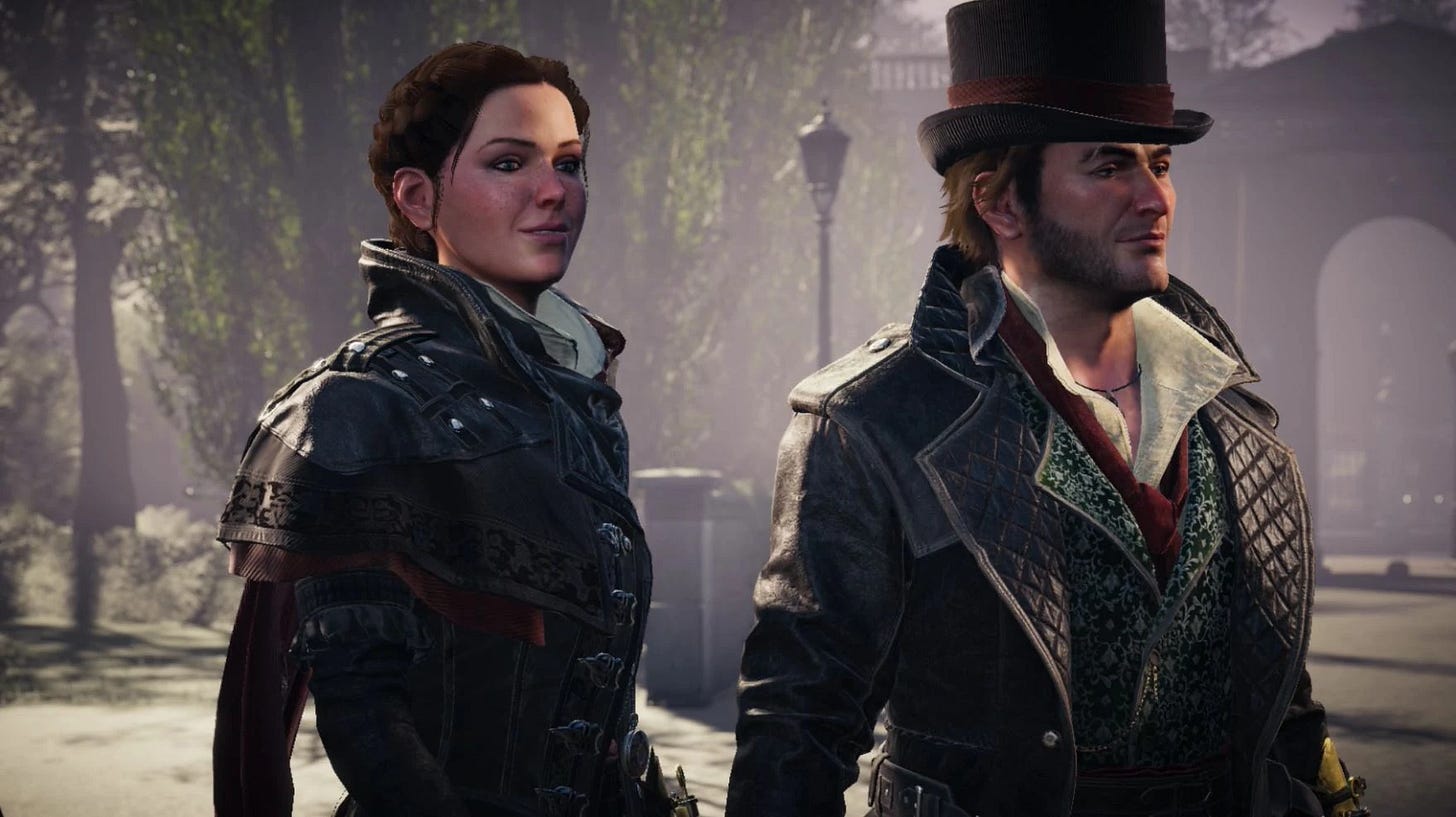
While sporting two protagonists wasn’t new for Assassin’s Creed, what sets Syndicate apart in comparison is being the first title to have both of its leads playable at the same time.
Jacob and Evie, by virtually every metric, being the fuel of the entire experience.
And great credit here must go to the writers and of course, their performers, Paul Amos and Victoria Atkin, who are tasked with finding both a strong individualism for their characters but as well, a shared dynamic between them. A lived-in back-and-forth speaking to siblings who, similar though they may be, view the world and approach it in vastly different ways. Sardonic praise for the other, most of the time, the only thing they can muster.
That, the Amos-Atkin rapport, being, without a doubt the very best of Syndicate’s character work.
Be it through the bigger profile of their on-stage performance capture or the intricacies they cultivated elsewhere. From their moment-to-moment line delivery (Jacob’s comedic bluntness against Evie’s more measured approach, for example) or the subtle touches one may not catch at a glance, right down to their contrasting physicalities, all informing a certain sense of creativity.
Passionate and wholly committed to their cause but almost naive in their initial optimism, the twins at first believe however they liberate London from Templar oppression that it will be a simple feat.
Just into their early twenties when the story begins, one can appreciate this, an almost cavalier immaturity which comes to present, for both, something akin to a coming-of-age story. The recent loss of their father, an Assassin remembered in esteem by his peers hangs over the twins too, albeit, in drastically different ways: Evie holds his wisdom in the highest regard, Jacob, preferring to carve out his own legacy.
Amos then, takes a man who is, by the character’s own admission, bold and uncompromising and works diligently to present just what makes him tick.
While previous titles primarily examined the Brotherhood through the lens of those brought into its fold later on (or in Rogue’s case, someone who turned their back on it entirely), Jacob represents an interesting, atypical intersection. It is the only life he has ever known and yet he openly bristles against the conformity it traditionally requires.
Chaos incarnate, he chafes under Evie and Henry’s suggestions of a slow-and-steady approach, itching to attack the Templars head-on. He takes the lead in establishing The Rooks and once set loose in London, eagerly sets about to dismantle the Order’s infrastructure however he can.
He has no patience for plans or careful strategy, preferring to fly by the seat-of-his-pants at all times, even when up against tasks or targets that would seemingly require a steadier hand. Cocksure but not without cause, nor never one to turn down a good fight, with his jabs or his fists.
There is a certain juvenility here that Amos clearly and expertly brings to life, his, a character who operates on a continuous high-wire energy-wise and he matches him at every step.
Though with each Templar-led industry he razes, Jacob’s haste unintentionally creates a leadership vacuum Evie must rectify, coupled with his insistence that, despite this, his boots-on-the-ground tactics are more effective. But after nearly being played by Templar Pearl Attaway in his pursuit and later, faced with the sadism of Maxwell Roth, Jacob comes to recognize the folly accompanying his operating principles: having taken the lessons of the Assassins to heart yes but not necessarily their finer points.
And in the aftermath of defeating Starrick, he admits as much. Coming to understand that he, through brute force alone, cannot change the world single-handed.
Amos delivers here, to effect, taking these competing facets and bringing them together with talent.
A man knowing enough to admit to his mistakes and a willingness to learn from them but with a devilish honesty that reveals he hasn’t lost what makes him unique either.
And although he isn’t the lead in Jack the Ripper, in the episode’s prologue sequence, this character growth is on full display, showcasing Jacob, sterner, more astute. Having taken on a leadership role for the Assassins in the intervening decades his is a hard-won experience, a maturity, that Amos sees shine through.
Then, there is Evie.
Proud of her heritage, while Jacob may see the Templar threat as unchecked opportunity, Evie sees a chessboard.
Methodical, studious and never one to leave a stray detail behind, she could easily come off as cold or unapproachable but Atkin gives her a sly undercurrent of charm that makes her incredibly endearing, right from the jump.
Open hearted and quick-witted, Evie is keen to assist any that could use her help but generally speaking, very much embodying The Creed in practical application, she has a more big picture view of the fight ahead. Should their enemies get their hands on the Piece of Eden, hypothetical though it may seem at first, there is no telling the damage they could cause.
But it is this, an almost to-a-fault rigidness in her thinking, that she finds challenged more than once throughout her time in London.
Atkin is wonderful in these moments, showing both Evie’s growth alongside the inner turmoil that defines it. She’s confident, yes and tremendously cool under pressure but often struggles to acknowledge that she more than has the ability to fully strike out on her own, from under the shadow of those who preceded her, particularly her father.
Cutting a path through the underworld however and bringing the Templars to task as she does, it is a conclusion Evie comes too, fully-realized in her individualism, if acknowledging as well, her brother’s brand of self-reliance.
Maintaining a reverence for what the Brotherhood stands for but outside of that, committing herself to a worldview that is particularly, wholly hers.
While Jacob acts as something of a counterweight to the then series standard, Evie, instead, deconstructs it. A fruitful bookend in the base game, further expanded on in Jack the Ripper.
Twenty years on, she may now be a composed Master Assassin but in facing down the Ripper’s horrific barbarism firsthand, Evie struggles in both not giving into the worst of her anger but equally so, in maintaining a clear head: knowing that to find her brother and restore order, only such commitment to her principles will see her rise above such hatred.
All-in-all, it is a humanity Atkin finds early and doesn’t once relent on.
Outro
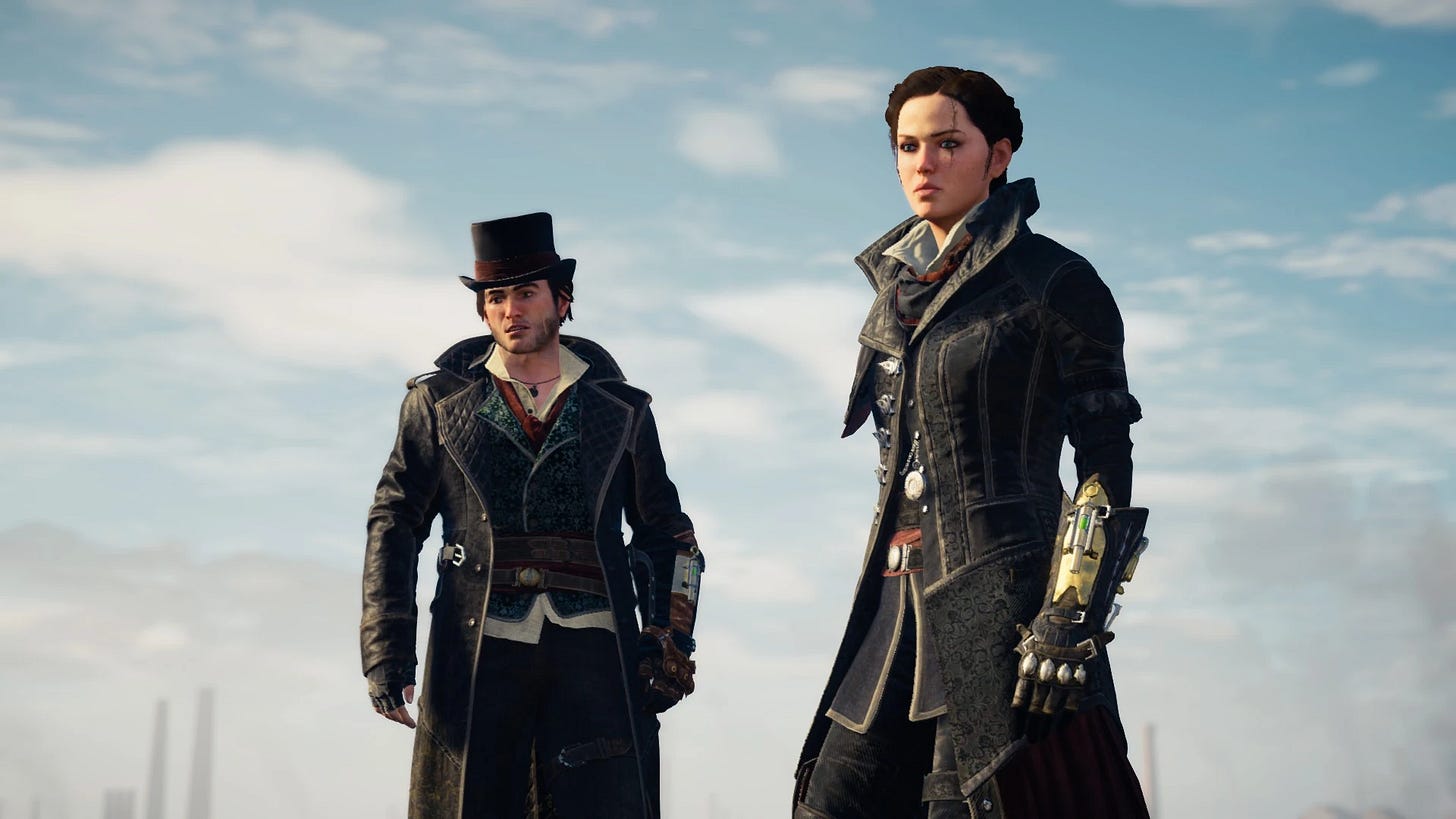
Syndicate isn’t above critique by any measure.
The moment-to-moment gameplay, while crisp, can feel stagnant at times, primarily the parkour, which, greatly scaled back when compared to its direct predecessor, never really allows the player to settle into a comfortable rhythm on that metric alone. And the main story, while good fun, can be unsteady thematically and visibly struggles to find an effective narrative balance for both its protagonists.
But the open world is impressive, as is the technical skill that brings it to life, from the soundtrack to the art design.
The performances are terrific, the more focused of its supporting story content speaks to a strong sense of creative understanding, with a player-first thinking to so much of the experience.
And ultimately, the game would be the last of its kind.
The franchise would reorient itself, come 2017’s Assassin’s Creed Origins, around a heavier RPG-style, which, while not totally stepping away from established-AC hallmarks, would firmly put forth new foundational pillars that have been, more-or-less, the standard since.
Syndicate then, a decade later, stands out.
Though not just for it what it used to represent or what it is inspired but for what it does on its own: a title altogether deserving of its praise.
Although never directly specified, Lydia’s history is confirmed within the in-game database: revealing that she personally trained under Jacob and Evie during her formative years before becoming an Assassin proper, later to see them evacuated from London at the onset of the war.



